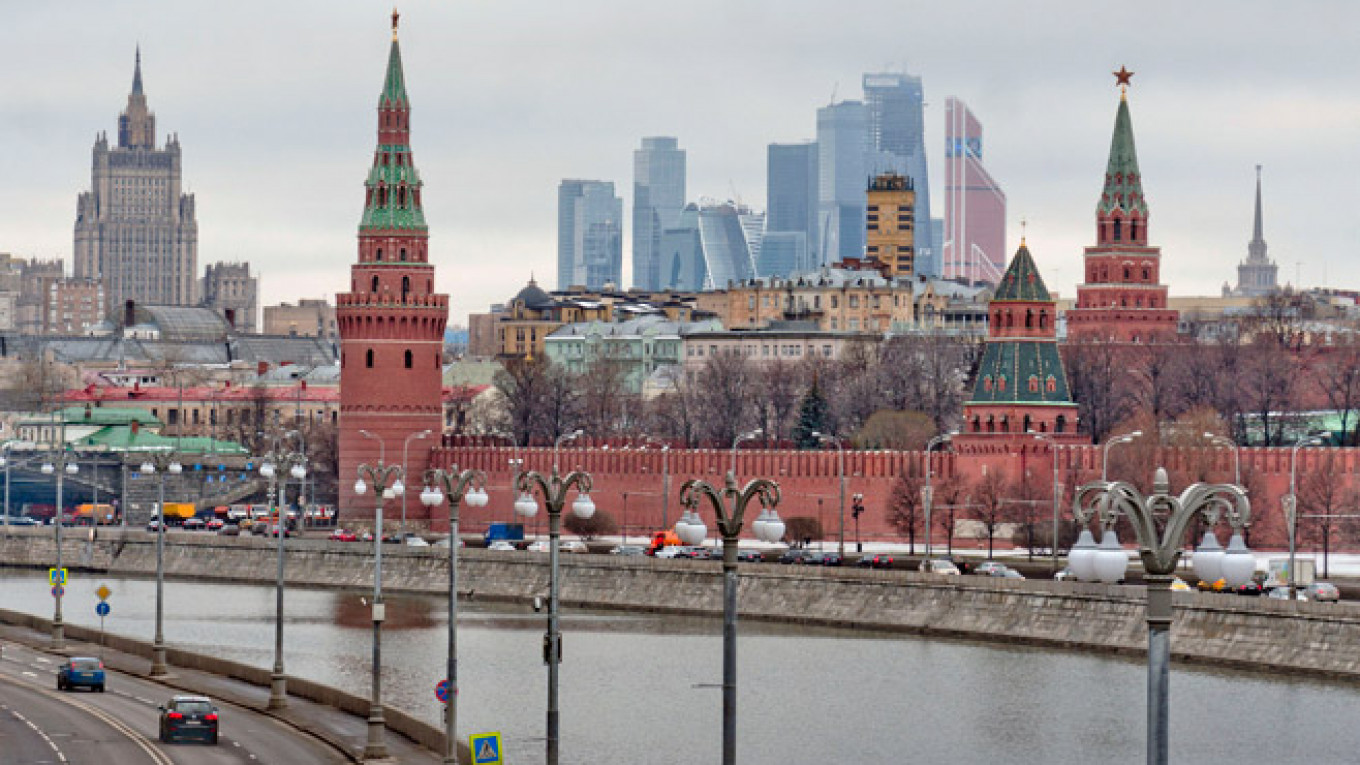Last spring, after Russia annexed Crimea and began intervening in eastern Ukraine, the United States and the European Union introduced sanctions against Russian individuals and businesses. But if sanctions are to be an effective tool in countering President Vladimir Putin's ambitions — a topic of ongoing debate in the West — they must combine a firm hand toward Russia's president with an open one toward its people.
To understand the role that sanctions can play in managing the Kremlin, one need only consider the importance of money to its occupant. From the beginning of the century until very recently, Russia was flooded with petrodollars; as the flow of money increased, so did Putin's audacity and aggression.
In 1999, oil and gas revenues contributed $40.5 billion to Russia's gross domestic product. As prices rose and production increased, this contribution increased substantially, averaging $73.5 billion annually from 2001 to 2004. Russia's growing wealth emboldened Putin, a change exemplified in his decision to arrest and imprison Mikhail Khodorkovsky, owner of oil giant Yukos, in 2003.
And the trend continued. From 2005-2008, annual hydrocarbon revenues were $223.6 billion higher than in 1999; at the end of this period, Russia invaded Georgia. In 2011-2013, Russia's annual oil and gas income peaked at $394 billion above 1999 levels, setting the stage for the Kremlin's interventions in Ukraine. In all of these cases, Putin acted on the conviction that Russia's oil wealth meant that rules — even international laws — did not apply to him.
But with the introduction of sanctions, financial markets are closed, for the most part, to Russian businesses. Oil prices are plummeting; Russia's finance minister estimates that the country's losses since last spring have surpassed $140 billion. Russia's strategic currency reserves are being pulled apart by Putin's friends and may be exhausted by the end of the year. Moreover, the ruble has lost close to 50 percent of its value over the last six months.
But, though the sanctions clearly are starting to bite, it will be some time before the bulk of the Russian public actually feels their impact. So the West needs to wait.
There is little point in engaging in a search for diplomatic solutions. They simply do not exist. Putin has chosen to act without regard for territorial integrity. He has declared himself a defender not only of Russian citizens, but of all ethnic Russians, Russophones, and even Orthodox Christians. He believes that he possesses the right to intervene in his neighbors' affairs, because, as he put it, "the Soviet Union was the same Russia, just called by another name." In other words, Ukraine is merely a breakaway region of historical Russia.
The Russian people, however, are modern enough to question these policies. The "Putin consensus" was built on the promise of rising prosperity — a promise that is quickly evaporating under the heat of sanctions. Most Russian elites think and act like businesspeople, not like romantic nationalists: as the economy sinks into prolonged recession, scrutiny and criticism of Putin's policies will increase.
The goal of Western sanctions should be to detach Russia's pre-modern rulers from its modern population. This strategy may be of little use in tightly controlled societies like Iran or North Korea; but Russia is essentially European. Instead of wasting time trying to negotiate, the West should focus on elaborating and publicizing a post-Putin agenda.
For starters, the West should explicitly deny any Russian claim to a right to interfere in the affairs of the EU and NATO. Ukraine should be embraced — even if Crimea and the Donbass are lost. A "new Marshall plan" should be rolled out, one that can transform Ukraine into a free, prosperous country that can join the EU and NATO, should it so desire.
Even more important, the West should make it clear that it extends its definition of Europe not just to Russia's borders, but across them. Russia should be acknowledged as an integral and natural part of Europe, and a country that might eventually join the EU. The grand strategy for the coming decades should be centered on a simple idea: Though Russia can never be allowed to influence Europe from outside, it will be welcome to gain a place of influence from within, if it accepts Europe's rules and norms.
Russians should be made to understand that they can choose one of two paths. They can follow Putin into isolation, probably ending up under Chinese influence — indeed, from China's perspective, its claim to Siberia all the way to Lake Baikal is even stronger than Russia's claim to Crimea. Or they can decide to move toward Europe, perhaps in the distant future joining the EU as its largest — and perhaps most influential — member.
The West's biggest mistake regarding Russia and Ukraine was to choose the path of indifference after the end of the Cold War. That led to the creation of the Commonwealth of Independent States in 1991 and the Budapest Memorandum on Security Assurances in 1994. If, instead, Russia and Ukraine had been encouraged to work toward joining the EU and were invited to join NATO, the arc of history would have been bent in a much more peaceful direction.
History rarely offers a second chance. But this time it has. The mistakes of the 1990s should be remedied, and the starting point should be to offer those who want to join the West the opportunity to work toward doing so. If Ukraine is brought into the European fold, the Russian people will want to follow — much sooner than anyone can now imagine.
Vladislav Inozemtsev is professor of Economics at Moscow's Higher School of Economics and director of the Center for Post-Industrial Studies. Copyright: Project Syndicate, 2015.
A Message from The Moscow Times:
Dear readers,
We are facing unprecedented challenges. Russia's Prosecutor General's Office has designated The Moscow Times as an "undesirable" organization, criminalizing our work and putting our staff at risk of prosecution. This follows our earlier unjust labeling as a "foreign agent."
These actions are direct attempts to silence independent journalism in Russia. The authorities claim our work "discredits the decisions of the Russian leadership." We see things differently: we strive to provide accurate, unbiased reporting on Russia.
We, the journalists of The Moscow Times, refuse to be silenced. But to continue our work, we need your help.
Your support, no matter how small, makes a world of difference. If you can, please support us monthly starting from just $2. It's quick to set up, and every contribution makes a significant impact.
By supporting The Moscow Times, you're defending open, independent journalism in the face of repression. Thank you for standing with us.
Remind me later.








